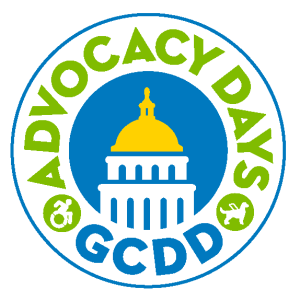Advocacy Days 2025
Registration is now open for GCDD's Advocacy Days!
Advocacy Days give members of Georgia's intellectual and developmental disabilities (I/DD) community the chance to connect directly with state leaders. They are a great opportunity for both new advocates and seasoned ones to have a real impact on our state's policies for people with I/DD.
There will be three Advocacy Days in 2025: January 29th, February 12th, and February 26th. See below for details and registration information.
And to help prepare for Advocacy Days, GCDD offers the following resources:
GCDD Employment/IPSE Advocacy Day
- When: Wednesday, January 29, 2025 from 9am to 1:30pm EST
- Location: Paul D. Coverdell Legislative Office Building, 18 Capitol Square Southwest Atlanta, GA 30334
Employment: Currently, employers at community rehabilitation programs in Georgia can legally pay people with disabilities less than the minimum wage. This is known as a 14(c) certificate and organizations holding one can pay people as little as 22¢ an hour. Advocates will meet with their legislators to call for a bill to end 14(c) certificates. This will ensure fair and livable wages for Georgians with disabilities.
Download an information sheet on 14(c) certificates (PDF)
Inclusive Post Secondary Education (IPSE): Georgia has been leading the way in advocating for Inclusive Post Secondary Education programs. Currently, Georgia has nine schools supporting people with intellectual disabilities (ID) to go to school in Georgia. These programs serve as a pipeline for future skilled and talented candidates with disabilities in Georgia to learn skills and get education that can help them to enter the workforce and/or live independently after college. Advocates will meet with their legislators to thank them for last year’s investment of $1.5 million.
Waivers and Wages Advocacy Day
- When: Wednesday, February 12, 2025 from 9am to 1:30pm EST
- Location: Paul D. Coverdell Legislative Office Building, 18 Capitol Square Southwest, Room 310, Atlanta, GA 30334
Waivers: COMP/NOW Waivers provide necessary care services and support to individuals with intellectual and developmental disabilities. Currently, we have over 7,000 Georgians waiting for waivers. They play a crucial role in offering pathways to employment and financial stability. Waivers also give people with disabilities a change to fully participate in their communities.
Download an information sheet on Waivers (PDF)
I/DD Commission Advocacy Day
I/DD Commission: Georgia’s system of support for adults with I/DD is outdated. A Senate study committee met in 2022 to determine the need for Medicaid services that keep people with disabilities in their home and communities. This committee recommended that the legislature funds 2,400 new NOW/COMP waivers and that it creates an I/DD commission.
The goal of the commission is to develop new solutions for ending the NOW/COMP waitlist, employment, housing, and other important issues for the disability community so that adults with I/DD can live, work, and thrive in our communities.
